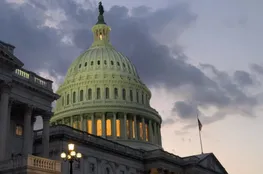Trump's 'Big, Beautiful Bill' Triggers Corporate Lobbying Blitz in Washington as 70 Firms Push to Kill Section 899: Report Top executives from major multinational corporations are descending upon Capitol Hill this week, engaged in a concerted lobbying effort to obstruct the implementation of a key provision within President Donald Trump’s recently unveiled tax proposal – often referred to as the "big, beautiful bill." The core of this resistance centers on Section 899 of the proposed package, a significant element designed to raise an estimated $116 billion in revenue over the next decade. This provision authorizes the U.S. government to impose higher taxes on investors and corporations originating from nations perceived to be engaging in unfair tax practices regarding American businesses, as detailed in a report by the Financial Times. Nearly 70 companies, including prominent players such as Shell PLC (SHELL), SAP SE (SAP), Toyota Motor Corporation (TM), and LVMH Moët Hennessy Louis Vuitton (LVMHF), are scheduled to meet with lawmakers, advocating for the removal or substantial revision of this contentious provision. Jonathan Samford, president of the Global Business Alliance, emphasized the critical importance of Section 899, stating, "It's a central topic, and there's growing momentum to eliminate this provision within the Senate." The Institute of International Bankers (IIB) is also spearheading efforts to arrange direct meetings with Treasury officials and key Senate Republicans, further demonstrating the breadth of the lobbying campaign.
Beth Zorc, CEO of the IIB, articulated the potential ramifications of Section 899, as passed by the U.S. House of Representatives. She warned that the policy would "stifle foreign direct investment, risk financial market disruptions, and endanger American jobs in states and communities across the country." The proposed tax change would involve an annual increase of 5% over four years on dividends and interest paid to foreign investors – a significant shift, and for the first time, it would specifically tax portfolio holdings of sovereign wealth funds. This policy would directly impact countries like the UK, Canada, Australia, and member states of the European Union. Considering the current landscape, the IIB highlights that foreign banks provided over $1.3 trillion in loans to U.S. businesses in 2023, underpinned by $5.4 trillion in direct investment from foreign companies and generating $270 billion in revenue. The potential for this capital to diminish or relocate due to a change in tax policy represents a considerable risk. Jason Smith, chair of the House Ways and Means Committee, defended the policy, asserting, "This is a way to help put them in check so that they understand that if they do that to US businesses, there will be consequences for their actions." He added, "Hopefully it'll never take effect."
See Also: ‘Collapse In Immigration’ Poses A Bigger Economic Threat Than Trump’s Tariffs, Warns Deutsche Bank: ‘Negative Supply Shock Is Not Good News For A Currency’ Why It Matters: Section 899 would increase taxes by 5% annually over four years on dividends and interest paid to foreign investors, and for the first time would tax portfolio holdings of sovereign wealth funds. The policy would impact countries like the UK, Canada, Australia, and EU member states. According to the IIB, foreign banks lent more than $1.3 trillion to U.S. businesses in 2023. Their support backed $5.4 trillion in direct investment from foreign companies and generated $270 billion in revenue. A change in tax policy may lead this capital to dry up or move elsewhere. Jason Smith , chair of the House Ways and Means Committee, said in defense of the policy: "This is a way to help put them in check so that they understand that if they do that to US businesses, there will be consequences for their actions."
Read Next: Trump-Musk Feud Moment ‘Expected’ By Generations Of Economics Students: ‘Vicious Fights Can Break Out’ Among Friends Over Budget, Says Justin Wolfers Photo courtesy: Rawpixel.com / Shutterstock.com © 2025 Benzinga.com. Benzinga does not provide investment advice. All rights reserved.
























